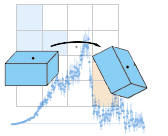
| HOME | PEOPLE | RESEARCH | ACADEMICS | TRAVEL/VISITORS | LINKS | CONTACT |

|
Web Mail
Mailing Lists
Computing Resources
Site Map
Distribution-Based Option Pricing on Lattice Asset Dynamics Models
Doctor Yuji Yamada, Control and Dynamical Systems, Caltech
Monday, March 13, 200011:00 AM to 12:00 PM
Steele 102
In real markets, empirical stock prices are not Gaussian, rather they are leptokurtotic; their marginal distributions usually possess ``heavy tails.'' However the famous Black-Scholes call option formula is derived under the assumption that the underlying stock price follows a generalized Brownian motion, implying that its log return distributions are Gaussian. This discrepancy may results in differences between the Black-Scholes price and true option's price, refered as ``smile effect'' or ``implied volatility smile'' in real markets.
The objective of this work is to propose another option pricing formula based on an arbitrarily given stock distribution, where the problem of optimally hedging the payoff on a European call option is considered through a self-financing trading strategy. We first formulate the option pricing problem as an optimal hedging problem and provide a minimum hedging technique for the single-period case on a trinomial tree. The problem for the multi-period case is solved on a trinomial lattice by assigning suitable probabilities on the trinomial lattice, where the underlying stock price distribution is derived directly from empirical stock price data which may posses heavy tails. We show that these probabilities are obtained from a network flow optimization which can be solved efficiently by linear programming. Numerical experiments will illustrate that our formula generates implied volatility smile in contrast to Black-Scholes case.
|
©2003-2011 California Institute of Technology. All Rights Reserved webmaster |
|